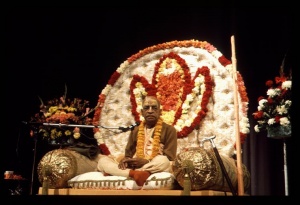BG 10.27: Difference between revisions
m (1 revision(s)) |
(Vanibot #0020 edit - link to the Version Compare feature) |
||
| Line 1: | Line 1: | ||
{{ | [[Category:Bhagavad-gita As It Is (1983+) - Chapter 10]] | ||
<div style="float:left">'''[[Bhagavad-gita As It Is (1983+)]] - [[BG 10 (1983+)|Chapter 10: The Opulence of the Absolute]]'''</div> | |||
<div style="float:right">[[File:Go-previous.png|link=BG 10.26]] '''[[BG 10.26]] - [[BG 10.28]]''' [[File:Go-next.png|link=BG 10.28]]</div> | |||
{{CompareVersions|BG|10.27|BG 1972|BG 1983+}} | |||
{{RandomImage}} | |||
==== TEXT 27 ==== | ==== TEXT 27 ==== | ||
<div class="devanagari"> | |||
:उच्चैःश्रवसमश्वानां विद्धि माममृतोद्भवम् । | |||
:ऐरावतं गजेन्द्राणां नराणां च नराधिपम् ॥२७॥ | |||
</div> | |||
<div | <div class="verse"> | ||
:uccaiḥśravasam aśvānāṁ | |||
:viddhi mām amṛtodbhavam | |||
:airāvataṁ gajendrāṇāṁ | |||
:narāṇāṁ ca narādhipam | |||
</div> | </div> | ||
==== SYNONYMS ==== | ==== SYNONYMS ==== | ||
<div class="synonyms"> | |||
<div | ''uccaiḥśravasam''—Uccaiḥśravā; ''aśvānām''—among horses; ''viddhi''—know; ''mām''—Me; ''amṛta-udbhavam''—produced from the churning of the ocean; ''airāvatam''—Airāvata; ''gaja-indrāṇām''—of lordly elephants; ''narāṇām''—among human beings; ''ca''—and; ''nara-adhipam''—the king. | ||
</div> | </div> | ||
==== TRANSLATION ==== | ==== TRANSLATION ==== | ||
<div class="translation"> | |||
<div | |||
Of horses know Me to be Uccaiḥśravā, produced during the churning of the ocean for nectar. Of lordly elephants I am Airāvata, and among men I am the monarch. | Of horses know Me to be Uccaiḥśravā, produced during the churning of the ocean for nectar. Of lordly elephants I am Airāvata, and among men I am the monarch. | ||
</div> | </div> | ||
==== PURPORT ==== | ==== PURPORT ==== | ||
<div class="purport"> | |||
The devotee demigods and the demons (''asuras'') once took part in churning the sea. From this churning, nectar and poison were produced, and Lord Śiva drank the poison. From the nectar were produced many entities, of which there was a horse named Uccaiḥśravā. Another animal produced from the nectar was an elephant named Airāvata. Because these two animals were produced from nectar, they have special significance, and they are representatives of Kṛṣṇa. | |||
Amongst the human beings, the king is the representative of Kṛṣṇa because Kṛṣṇa is the maintainer of the universe, and the kings, who are appointed on account of their godly qualifications, are maintainers of their kingdoms. Kings like Mahārāja Yudhiṣṭhira, Mahārāja Parīkṣit and Lord Rāma were all highly righteous kings who always thought of the citizens' welfare. In Vedic literature, the king is considered to be the representative of God. In this age, however, with the corruption of the principles of religion, monarchy decayed and is now finally abolished. It is to be understood that in the past, however, people were more happy under righteous kings. | |||
</div> | |||
<div style="float:right; clear:both;">[[File:Go-previous.png|link=BG 10.26]] '''[[BG 10.26]] - [[BG 10.28]]''' [[File:Go-next.png|link=BG 10.28]]</div> | |||
</div> | __NOTOC__ | ||
__NOTOC__ | __NOEDITSECTION__ | ||
Revision as of 19:03, 7 December 2017

A.C. Bhaktivedanta Swami Prabhupada
TEXT 27
- उच्चैःश्रवसमश्वानां विद्धि माममृतोद्भवम् ।
- ऐरावतं गजेन्द्राणां नराणां च नराधिपम् ॥२७॥
- uccaiḥśravasam aśvānāṁ
- viddhi mām amṛtodbhavam
- airāvataṁ gajendrāṇāṁ
- narāṇāṁ ca narādhipam
SYNONYMS
uccaiḥśravasam—Uccaiḥśravā; aśvānām—among horses; viddhi—know; mām—Me; amṛta-udbhavam—produced from the churning of the ocean; airāvatam—Airāvata; gaja-indrāṇām—of lordly elephants; narāṇām—among human beings; ca—and; nara-adhipam—the king.
TRANSLATION
Of horses know Me to be Uccaiḥśravā, produced during the churning of the ocean for nectar. Of lordly elephants I am Airāvata, and among men I am the monarch.
PURPORT
The devotee demigods and the demons (asuras) once took part in churning the sea. From this churning, nectar and poison were produced, and Lord Śiva drank the poison. From the nectar were produced many entities, of which there was a horse named Uccaiḥśravā. Another animal produced from the nectar was an elephant named Airāvata. Because these two animals were produced from nectar, they have special significance, and they are representatives of Kṛṣṇa.
Amongst the human beings, the king is the representative of Kṛṣṇa because Kṛṣṇa is the maintainer of the universe, and the kings, who are appointed on account of their godly qualifications, are maintainers of their kingdoms. Kings like Mahārāja Yudhiṣṭhira, Mahārāja Parīkṣit and Lord Rāma were all highly righteous kings who always thought of the citizens' welfare. In Vedic literature, the king is considered to be the representative of God. In this age, however, with the corruption of the principles of religion, monarchy decayed and is now finally abolished. It is to be understood that in the past, however, people were more happy under righteous kings.